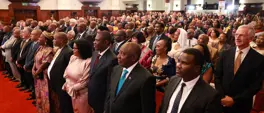JAMIL F. KHAN | How sexual misconduct is shielded by tradition in South Africa
Jamil F. Khan
4 August 2025 | 9:58'Cultures are not static objects that once formed, remain intact forever. The very cultures practised today as if they are some kind of divine law, were once differently practised,' writes Jamil F. Khan.

Eastern Cape Judge President Selby Mbenenge. Picture: Judges Matter
The state of thought on sexual misconduct in South Africa remains disappointing and shocking. Our society’s literacy on social relations and their associated power dynamics leaves much to be desired on many fronts, but our relationship with gendered abuse keeps my mouth agape.
We ask, constantly, how it is possible that a nation can insist on such violence, when the devastating impact is so clear to see? We are so committed to it that we argue for its survival in courts of law, armed with the cloak of culture.
In its latest iteration, during the ongoing sexual harassment case against Judge President Selby Mbenenge, the cloak of culture has been used to rebrand sexual harassment as a courting practice.
When testifying as an expert on gender-based violence, Dr Lisa Vetten noted how Mbenenge was persistent in his request for nude pictures and information about sexual position preference from judges’ secretary, Andiswa Mengo.
In response, Advocate Sikhakhane suggested that Vetten’s lack of Xhosa culture makes her biased, and further invoked a very gendered challenge by asking: “Are you suggesting to a Xhosa man how he should engage in courting? You were venturing into something that is embedded into culture.”
Sikhakhane’s deliberate insistence that this is about a “Xhosa man’s” right to a particular style of courting has an accusatory undertone, that manipulates the historical emasculation of Black men under white supremacy – suggesting in the most grotesque way that a white woman’s word on the matter is automatically sinister.
His second subtle threat, relying on the idea that courting practices, whether based on consent or not, are untouchable because they “embedded” into culture works not only as a pushback on white interference, but also as a vanguard protecting the sanctity of culture, at all costs. These costs are always paid by women, children and queer people – the sacrificial lambs of cultures built on cisheterosexual male supremacy.
From the vantage point suggesting that whatever a man is entitled to under culture cannot be considered abuse, sexual misconduct is then conferred a cultural status of its own, making it not only a part of culture, but a culture in its own right. Not just a culture belonging to the social practices of one ethnic group, but a South African culture. The story of sexual violence as a South African culture, predates even the cultures in question.
If we are to truly reckon with its hold on our society, we must confront that the origins of the South African state was founded on sexual violence – a tool of the enslavement which gave birth to this nation and its history of oppressive governance.
The idea that women exist to serve the needs of men was realised through the violent white supremacy that colonised this land into servitude. To reckon with the history of violence in this country requires us to confront how what we now call ‘African cultures’ has not remained untainted by the colonial logics of domination and gender based violence.
Cultures are not static objects that once formed, remain intact forever. The very cultures practised today as if they are some kind of divine law, were once differently practised.
Those differences are owed to the circumstances under which they were developed, which included the influences of the natural landscape, weather patterns, political challenges, technological advancements, the needs of communities and even the prevalence of plagues, to name a few. Why cultures establish rules and regulations are responses to the environment and as those environments change, so should the cultures.
One prevailing threat that African cultures have faced has been white supremacy and its political outcomes. Under these conditions, it is reasonable that we would want to protect our cultures. However, this must be done with a degree of critical thought.
It is necessary, in the evolution of cultures, to revise and rethink cultural practices on an ongoing basis to assess their relevance and necessity in a constantly changing world.
Within this assessment, a more uncomfortable job lies: interrogating history to see how colonial values and standards have been embedded into what is now vaguely and generically referred to as “African values”. This interrogation also requires us to ask questions about why certain colonial practices are accepted and others are rejected if we agree that colonialism was always and only bad. Whatever the outcomes, we must face the reality that with all the power it has had to enforce its logic on us, there is no way that it did not taint our cultures.
Cultures do comprise harmful ideas and practices that oppress and cause the suffering of many who are subscribed to them, despite their beautiful elements that are romanticised. When this reality is raised, the last vestige of protection prompts a default to the argument of nature.
In the case of sexual violence, it is the supposed natural inferiority and weakness of women, children and queer people that justifies the harm that cisheterosexual men can do to them. As is evident, nothing natural requires violence in order to enforce it. If it were the case, people would not have been resisting their oppression since the beginning of time. The nature argument is also one that has been used to justify the oppression of every group deemed ‘other’ under white supremacy.
There simply are no justifications for the abuse of others. If we are going to rely on the cloak of culture for these justifications, we must stare down the fact that cultures are simply the products of collective decision making, often by those who hold undue power, aimed at benefitting a privileged few.
When maintained through force and a violation of consent, cultures are narrowed down to regimes of domination for which there can be no sanctity. If culture dictates that we can overpower, harass, and intimidate others to submit to our will, then we need new cultures.
We are not all beholden to the rules of individual cultures, but we are beholden to the provisions of the Constitution, which remains the supreme law of the land. Culture, especially when used to harm, is not sacred.
Jamil F. Khan is an award-winning author, doctoral critical diversity scholar, and research fellow at the Johannesburg Institute for Advanced Study
Get the whole picture 💡
Take a look at the topic timeline for all related articles.
Trending News
More in Opinion

20 February 2026 14:45
JAMIL F. KHAN | Democratic institutions must be protected from rising religious fundamentalism

19 February 2026 05:15
CHARLES MATSEKE | From State of the Nation to Republic of Commissions: SA's playhouse of accountability

18 February 2026 17:30
VUYANI PAMBO | Biko, Bonga, and the running waters of Gauteng: Towards a liberation theology for South Africa's 2026 Elections













